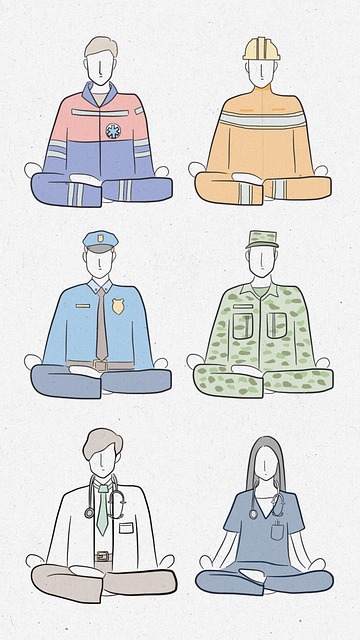Longmont First Responders Therapy recognizes the unique stress and mental health challenges faced by local first responders, offering specialized workshops to address trauma, high-pressure situations, and shift work. Through evidence-based techniques like mindfulness and cognitive behavioral therapy, they empower these professionals with coping strategies. Cultural competency training ensures therapists understand the diverse backgrounds of first responders, fostering open dialogue. Interactive activities, group support, and continuous evaluation enhance program effectiveness, providing ongoing stress management tools for Longmont's critical workers.
In the demanding line of duty, Longmont’s first responders often face unparalleled stress and challenges. “Understanding Stress Among First Responders: Unveiling the Challenges” explores the unique pressures they endure. Subsequently, “Designing Effective Stress Management Workshops for Longmont’s Heroes” presents strategies tailored to their needs, offering therapeutic solutions. Finally, “Post-Workshop Evaluation and Continuous Support for First Responder Wellbeing” emphasizes ongoing care vital to their resilience through “Longmont First Responders Therapy.”
- Understanding Stress Among First Responders: Unveiling the Challenges
- Designing Effective Stress Management Workshops for Longmont's Heroes
- Post-Workshop Evaluation and Continuous Support for First Responder Wellbeing
Understanding Stress Among First Responders: Unveiling the Challenges

Understanding stress among first responders is a critical step in organizing effective therapy sessions tailored to their unique challenges. First responders, including police officers, firefighters, and paramedics, often face highly stressful situations on a daily basis that can take a significant toll on their mental health. The nature of their work exposes them to trauma, violence, and life-threatening conditions, which can lead to elevated stress levels and potentially impact their overall well-being.
In Longmont, where first responders play a vital role in community safety, recognizing the importance of dedicated therapy sessions becomes evident. These workshops should address the specific stressors they encounter, such as dealing with traumatic events, managing high-pressure situations, and coping with shift work. Incorporating self-awareness exercises and mood management techniques can empower first responders to develop healthy coping strategies. Moreover, healthcare provider cultural competency training ensures that therapists understand the unique cultural nuances of their clients, fostering a supportive environment for open dialogue and effective treatment.
Designing Effective Stress Management Workshops for Longmont's Heroes

In designing stress management workshops for Longmont’s first responders, it’s imperative to tailor sessions that cater to their unique needs and challenges. These heroes often face traumatic situations, demanding high levels of physical and emotional resilience. Effective workshops should focus on providing practical tools for coping with stress, anxiety, and potential PTSD symptoms. Incorporating techniques like mindfulness meditation, deep breathing exercises, and cognitive behavioral therapy (CBT) strategies can empower first responders to develop inner strength and maintain mental well-being.
The curriculum must also address cultural sensitivity in mental healthcare practice, recognizing the diverse backgrounds and experiences within the Longmont community. By fostering a supportive environment that respects individual differences, these workshops can enhance self-esteem improvement for first responders. Through interactive activities, group discussions, and peer support, participants can build resilience, cultivate a sense of belonging, and learn effective stress management techniques to navigate their demanding careers.
Post-Workshop Evaluation and Continuous Support for First Responder Wellbeing

After each workshop, a comprehensive post-evaluation process is initiated to gauge the effectiveness of the program. This involves gathering feedback from participants, focusing on their experiences, perceived learning outcomes, and suggestions for improvement. The insights gained from these evaluations are instrumental in refining the workshop content and delivery methods to better cater to the unique needs of first responders.
Longmont First Responders Therapy recognizes that stress management is an ongoing process. To ensure continuous support, post-workshop resources, including self-help guides, meditation recordings, and referrals to mental health professionals, are provided to all attendees. Additionally, follow-up sessions are organized periodically to reinforce learned conflict resolution techniques and depression prevention strategies, fostering a resilient and supportive environment for first responders to thrive in their critical roles.
Stress management workshops tailored for Longmont’s first responders are a vital step towards enhancing their mental wellbeing. By addressing the unique challenges these heroes face, these sessions provide practical tools for coping with stress and trauma. The positive impact extends beyond individual resilience; it contributes to a healthier, more supportive community for all of Longmont’s first responder therapy needs. Continuous evaluation and follow-up ensure that the workshops remain effective and aligned with the evolving demands of these brave individuals.














